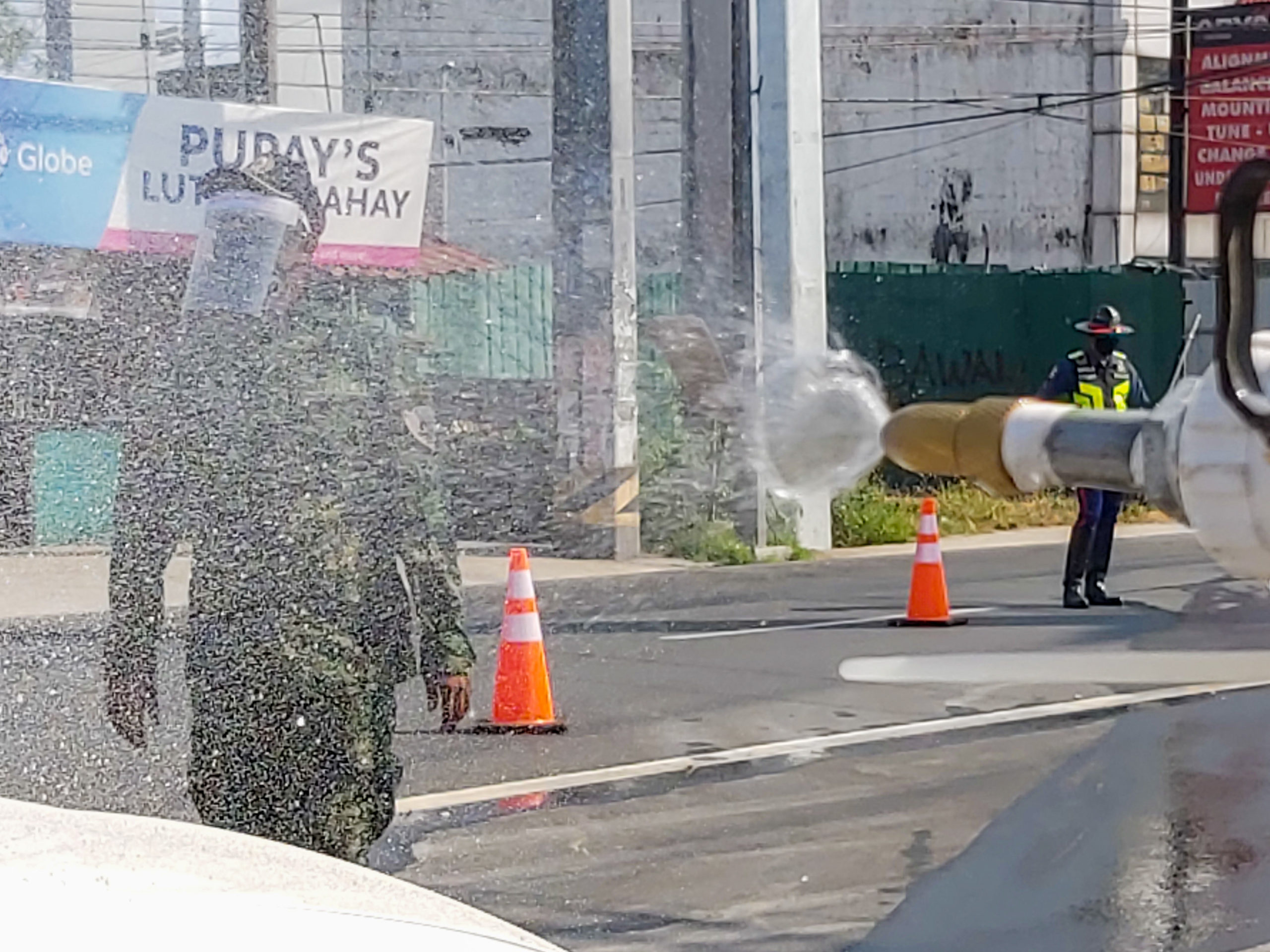Local governments in quandary over spraying

MISTING With the Luzon-wide enhanced community quarantine extended until April 30, vehicles are sprayed with a mild bleach disinfecting solution before entering the city proper of Calamba, Laguna province. (Photo by CHRIS QUINTANA / Contributor)
SAN PEDRO CITY, Laguna, Philippines — Hundreds of thousands of pesos of local government funds might end up dissipating just like the disinfectants used in community misting and spraying after the Department of Health (DOH) said the measure was ineffective against the new coronavirus disease (COVID-19) epidemic.
Elias Fernandez, Department of the Interior and Local Government (DILG) chief in Calabarzon (Cavite, Laguna, Batangas, Rizal and Quezon), said he was waiting for guidelines from the central office on whether to order local government units (LGUs) to stop misting and spraying activities, which had been widely practiced since the disease broke out locally in March.
But until then, the mayors said they would keep doing so in open spaces, wet markets and streets.
Like Wuhan
“The problem with the DOH [advisory] is it does not say anything more than: ‘[It’s] not recommended.’ Isn’t it (public misting) the same thing they had been doing in Wuhan (China)?” said Mayor Walfredo Dimaguila Jr. of Biñan City in Laguna.
Wuhan City is the known ground zero of the coronavirus.
Article continues after this advertisementDimaguila said the advisory was not only confusing but came too late since the city had already spent P200,000 to P300,000 on disinfectants.
Article continues after this advertisementIn Batangas, Lipa City Mayor Eric Africa said they would keep on spraying disinfectants using chemicals known to be safe on food and even human skin.
The DOH, in an April 10 advisory, said “spraying or misting does not protect against COVID-19, and may even cause harm.” This means, it “does not recommend” the measure as there is “no evidence to support that spraying of surfaces or large scale misting of areas, indoor or outdoor with disinfecting agents, kills the virus.” On the other hand, the department said the practice might cause pathogens to be dispersed during spraying, resulting in skin irritation, inhalation of chemicals and damage to the environment.
The DOH said it followed the advice of the World Health Organization and the University of the Philippines-National Poison Management and Control Center and recommended instead soaking objects or directly disinfecting surfaces.
COVID-buster
In Imus, Cavite province, the Bureau of Fire Protection has its own decontamination measures on top of the citywide misting.
In Sta. Rosa City, Laguna, Rep. Danilo Fernandez said a team of “COVID-busters” had been regularly spraying surroundings and even distributing to households some 2,000 liters of disinfectants, using activated carbon aside from sodium hypochlorite (bleach) and salt diluted in water.
Fernandez said the LGUs learned the right mixture through an earlier DOH advisory.
A misting machine normally costs from P100,000 to P150,000, while several local governments have improvised with sprayers mounted on firetrucks, according to the DILG in Laguna.
“We’re like in the middle of a war where all weapons should be made available for people’s use. If you take this one (misting) out, it creates a feeling of helplessness,” Fernandez said. INQ
For more news about the novel coronavirus click here.
What you need to know about Coronavirus.
For more information on COVID-19, call the DOH Hotline: (02) 86517800 local 1149/1150.
The Inquirer Foundation supports our healthcare frontliners and is still accepting cash donations to be deposited at Banco de Oro (BDO) current account #007960018860 or donate through PayMaya using this link.